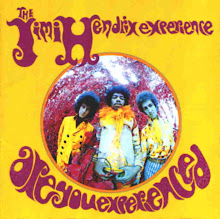 I 've got pretty much every note the Kinks recorded on my iPod -- certainly everything through 1980. And it all sounds good. The Kinks are the only major band from the Sixties I can think of that didn't go psychedelic, didn't do any of that crap that all of the other big bands did at the time. When everyone was writing about Eastern mysticism, Ray Davies was writing about a two-up/two-down flat in some suburb of London. Ray wrote songs about the things that were important to him. He invented his world and gave it life. And in that world, people weren't wearing Nehru jackets, smoking pot and jamming for twenty-four hours a day. The Kinks created a different world -- and I'm glad for it.
I 've got pretty much every note the Kinks recorded on my iPod -- certainly everything through 1980. And it all sounds good. The Kinks are the only major band from the Sixties I can think of that didn't go psychedelic, didn't do any of that crap that all of the other big bands did at the time. When everyone was writing about Eastern mysticism, Ray Davies was writing about a two-up/two-down flat in some suburb of London. Ray wrote songs about the things that were important to him. He invented his world and gave it life. And in that world, people weren't wearing Nehru jackets, smoking pot and jamming for twenty-four hours a day. The Kinks created a different world -- and I'm glad for it.When I first heard Village Green Preservation Society, in 1971, I got this picture in my head of small-town English life: village greens, draft beer. But when R.E.M. went to England in 1985, I drove through Muswell Hill -- and it certainly wasn't romantic-looking. From "Waterloo Sunset," I had this picture of a gorgeous vista -- when it's really a grimy train-station area. I realized these songs were all acts of imagination, that Ray was commemorating an England that was slipping away. There is a great air of sadness in those songs.
 I am amazed at how great the Kinks' records sounded -- even though, when you listen closely, there is very little going on in them. Village Green is the best example: There are two or three instruments in each song. And yet the songs are perfectly realized, well arranged.
I am amazed at how great the Kinks' records sounded -- even though, when you listen closely, there is very little going on in them. Village Green is the best example: There are two or three instruments in each song. And yet the songs are perfectly realized, well arranged.I read that Ray wrote "You Really Got Me" on piano. Then he gives it to his brother Dave, this teenage maniac, who turns it into a demented guitar part. An interviewer once asked Dave if he thought the Kinks had gone heavy metal in the Eighties. He said, "It wasn't called heavy metal when I invented it." When R.E.M. started, Dave's solo on that song was the only solo I knew. So whenever I had to do a solo, I'd play that.
The Kinks slipped into rock history through the back door. All of those great albums that we talk about now, like Face to Face and Village Green -- nobody bought those records in the Sixties. But those of us who love those records -- and a lot of us are musicians -have loved them for more than thirty years.






